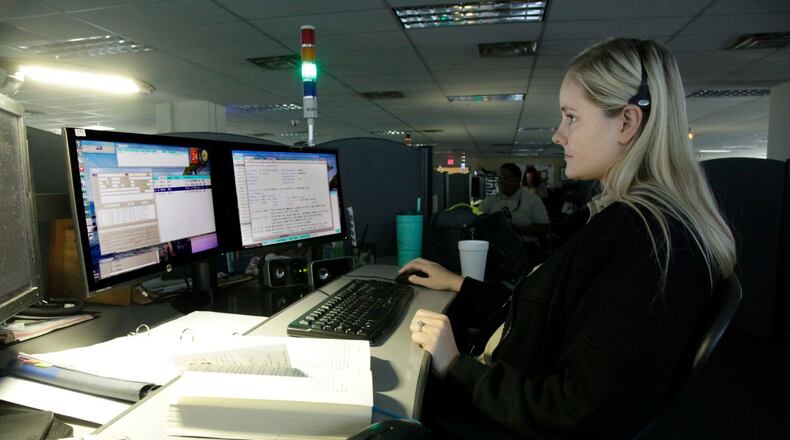Local law enforcement has also urged citizens not to call 911 to report noncompliance with mask orders or larger-than-allowed gatherings .
Citizens generally should only call 911 for immediate life-threatening situations, like if they are having chest pains or difficulty breathing, said Dan Suffoletto, spokesperson for Public Health -- Dayton & Montgomery County.
People who are just feeling ill should contact their doctors or health care providers or visit urgent care centers to figure out next steps and treatment, he said.
“My guess is that even in the best of times they get calls like that, which probably shouldn’t go to 911,” he said.
COVID calls in Dayton
The Dayton Fire Department received 183 potential and confirmed COVID-19 calls in July, which was double June’s tally, according to department data. In August, suspected and confirmed coronavirus calls declined about 32%.
Since the start of the outbreak, the fire department has recorded 623 potential and 155 confirmed COVID-19 calls, according to data through the end of last month.
Potential COVID-19 calls mean the crews assigned to the incidents suspected the patients may be infected based on factors like reported symptoms, self-reported exposure or removal of the patient from a facility with known coronavirus cases, said Dayton Fire Department Capt. Brad French, who is the department’s public information officer.
Calls are confirmed when the fire department receives outside verification that a patient tested positive for the virus after transport.
Citizens who believe they are having a medical emergency should call 911, French said, and most COVID-19 calls for service have been requests for medical transport to local emergency departments for evaluation of their symptoms.
But French said occasionally citizens have called 911 seeking general information about the virus or to ask to be taken to the hospital even though they have no signs of infection.
“The Dayton Fire Department would never discourage a citizen from calling 911 if they feel that they’re having a medical emergency,” French said.
Wrong call
Clearcreek Fire District Chief Steve Agenbroad said his agency has had a few people reach out with COVID-19 questions. He said his crews usually direct these citizens to resources like the CDC, state and county health departments and local news outlets.
“Most of our residents as a whole have adapted well and handled the situation very well,” Agenbroad said.
The 911 dispatchers in Montgomery County are instructed to refer callers wanting information about the coronavirus to public health, the Ohio Department of Health and the CDC, said Christine Ton, media director for the Montgomery County Sheriff’s Office.
“Citizens should use the coronavirus.ohio.gov website for inquiries about the virus and testing locations,” Ton said. “Local media outlets and social media are good resources for obtaining locations of ’pop-up’ testing sites that don’t require a physician’s note for testing.”
Public Health -- Dayton & Montgomery County provides general information and updates about the coronavirus on its website, and there are coronavirus hotlines that can assist citizens. Montgomery County’s hotline (937-225-6217) can help people find testing sites and times.
Also, Suffoletto said, telehealth options are available around the clock that people can use to get medical consultation if they are worried they might be infected.
Mask police
The pandemic has led to other 911 problems, particularly after local and state officials issued emergency orders aimed at combating the spread of infection.
In March, Montgomery County Sheriff Rob Streck urged citizens to stop calling 911 to ask about the state’s stay-at-home order.
Thankfully, the Montgomery County Sheriff’s Office has not received many calls lately about these concerns, Ton said.
In July, both Butler County Sheriff Richard Jones and the Darke County Sheriff’s Office asked the public not to report potential violations of the state’s mask requirement. Both said they are not the “mask police.”
The 911 dispatchers in Darke County haven’t had issues with non-emergency COVID-19 calls, but they have fielded some calls from people wanting to report large parties, and callers were instructed to contact the health department, said Melissa Hawes, 911 coordinator for the Darke County Sheriff’s Office.
When new health orders are issued, some people call the non-emergency lines wanting to know what they mean and what they are supposed to do, she said.
“Law enforcement doesn’t usually have special instructions or information ahead of time, so we just direct citizens to the governor’s office or website and explain to them that these orders are not something we are involved in,” she said.
A few larger suburban communities in southern Montgomery County have not seen a noticeable increase in 911 calls for COVID-19 related issues, officials said.
A few calls involving non-compliance to state orders were received by Kettering dispatchers “at the onset of the pandemic,” but it hasn’t been an issue recently, according to John Moore, public information officer for the city’s fire department.
EMS calls for service in Dayton have declined more than 4% through the first seven months of the year, compared to 2019. Fire administrators and medical advisors believe call volumes have decreased during the pandemic because citizens are worried about being exposed to the virus either during medical transport or at the hospital.
Some medical professionals fear that patients aren’t seeking the medical treatment they need for non-coronavirus conditions because they are worried about getting sick with the virus.
Suffoletto said citizens should schedule needed medical treatment, in consultation with their doctors and medical providers.
“You shouldn’t on your own decide not to do those things,” he said.
Staff writers Nick Blizzard, Eric Schwartzberg and Lawrence Budd contributed to this report.
About the Author

